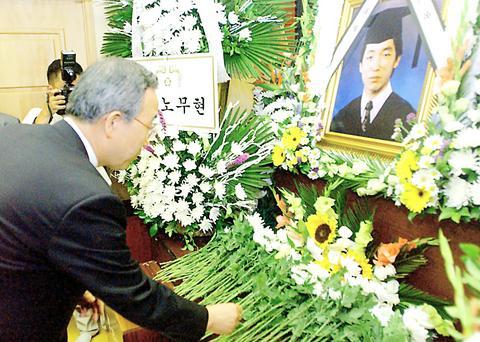South Koreans reacted with shock and anger yesterday to the beheading of a hostage in Iraq by militants who killed him after Seoul refused their demand to withdraw its troops and scrap plans to send more.
US soldiers found the decapitated body of Kim Sun-il on Tuesday, five days after he was seized in Fallujah, west of Baghdad, by a group led by militant Abu Musab al-Zarqawi.

PHOTO: AP
The group killed 33-year-old Kim, who had been shown in a video pleading for his life, after Seoul stood firm on keeping 670 South Korean medics and engineers in Iraq and on plans to send 3,000 troops to join US-led forces there.
A sombre President Roh Moo-hyun condemned the killing but said South Korea would send troops rather than bow to terrorism.
"I still feel heartbroken to remember that the deceased was desperately pleading for his life," Roh said, referring to the video showing a terrified Kim crying: "I don't want to die."
Kim's parents had urged their government to do everything to save their son, an Arabic speaker and evangelical Christian, who worked in Iraq for a year as a translator for a South Korean firm supplying goods to the US army.
After news of his death, they sat cross-legged and stunned in their modest backstreet house in the South Korean city of Pusan, as relatives and neighbors sought to console his sister, who was wailing and thrashing around in grief.
Roh has argued the troop decision was a tough but crucial step to support its US ally and that the forces were intended to help rebuild the country.
Since early April, dozens of foreign hostages have been seized in Iraq.

MAKING WAVES: China’s maritime militia could become a nontraditional threat in war, clogging up shipping lanes to prevent US or Japanese intervention, a report said About 1,900 Chinese ships flying flags of convenience and fishing vessels that participated in China’s military exercises around Taiwan last month and in January have been listed for monitoring, Coast Guard Administration (CGA) Deputy Director-General Hsieh Ching-chin (謝慶欽) said yesterday. Following amendments to the Commercial Port Act (商港法) and the Law of Ships (船舶法) last month, the CGA can designate possible berthing areas or deny ports of call for vessels suspected of loitering around areas where undersea cables can be accessed, Oceans Affairs Council Minister Kuan Bi-ling (管碧玲) said. The list of suspected ships, originally 300, had risen to about 1,900 as

Right-wing political scientist Laura Fernandez on Sunday won Costa Rica’s presidential election by a landslide, after promising to crack down on rising violence linked to the cocaine trade. Fernandez’s nearest rival, economist Alvaro Ramos, conceded defeat as results showed the ruling party far exceeding the threshold of 40 percent needed to avoid a runoff. With 94 percent of polling stations counted, the political heir of outgoing Costa Rican President Rodrigo Chaves had captured 48.3 percent of the vote compared with Ramos’ 33.4 percent, the Supreme Electoral Tribunal said. As soon as the first results were announced, members of Fernandez’s Sovereign People’s Party

MORE RESPONSIBILITY: Draftees would be expected to fight alongside professional soldiers, likely requiring the transformation of some training brigades into combat units The armed forces are to start incorporating new conscripts into combined arms brigades this year to enhance combat readiness, the Executive Yuan’s latest policy report said. The new policy would affect Taiwanese men entering the military for their compulsory service, which was extended to one year under reforms by then-president Tsai Ing-wen (蔡英文) in 2022. The conscripts would be trained to operate machine guns, uncrewed aerial vehicles, anti-tank guided missile launchers and Stinger air defense systems, the report said, adding that the basic training would be lengthened to eight weeks. After basic training, conscripts would be sorted into infantry battalions that would take

GROWING AMBITIONS: The scale and tempo of the operations show that the Strait has become the core theater for China to expand its security interests, the report said Chinese military aircraft incursions around Taiwan have surged nearly 15-fold over the past five years, according to a report released yesterday by the Democratic Progressive Party’s (DPP) Department of China Affairs. Sorties in the Taiwan Strait were previously irregular, totaling 380 in 2020, but have since evolved into routine operations, the report showed. “This demonstrates that the Taiwan Strait has become both the starting point and testing ground for Beijing’s expansionist ambitions,” it said. Driven by military expansionism, China is systematically pursuing actions aimed at altering the regional “status quo,” the department said, adding that Taiwan represents the most critical link in China’s